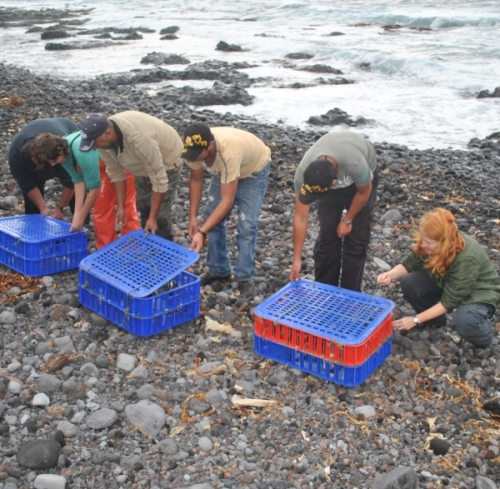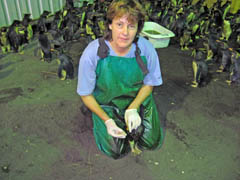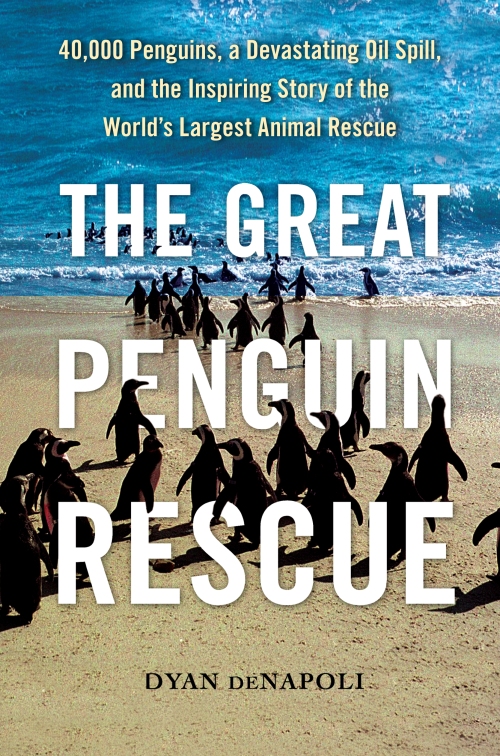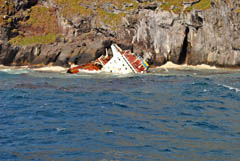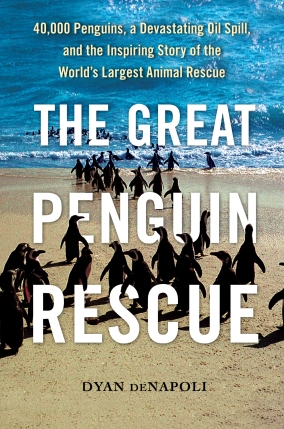This past Sunday marked an important turning point in the massive rescue operation currently underway at Tristan da Cunha. Of the 3,662 oiled penguins that have been collected to date, twenty-four lucky birds were released after making it through the cleaning and rehabilitation process. Here is a link to an article about this release from BirdLife International’s website: First Tristan penguins released from rehab. Katrine Herian, RSPB’S Project Officer on the island, was quoted as saying, “It was an emotional moment to see these penguins released from captivity and walk into the sea and then swim off among the waves.”
Having served as a rehabilitation supervisor during the rescue of 19,000 oiled penguins during the Treasure oil spill in 2000, I can just imagine the thrill of that moment. I say ‘imagine’ because I was in South Africa for the first three weeks of the operation, and most of our team had to leave Cape Town before any of the penguins were released. It was incredibly hard to leave without knowing how the penguins would fare – and excruciating leaving our colleagues behind where there was still so much work to be done. I always felt as though we had missed an important part of the rescue experience by not witnessing a release of some of the penguins we had worked so hard to save.
But the work is far from over on Tristan. They still have more than 3,600 oiled birds under their care – and thousands more oiled penguins (as well as other oiled birds and marine mammals) are still out on the islands. In addition to the oiled birds they’ve rescued, about 1,500 clean penguins have been collected to be transported to clean waters far from the area. So far, about 375 of the oiled penguins they’ve collected have died. Because it has taken so long for supplies and more help to arrive, the penguins’ chances of survival are more tenuous. The longer a penguin sits covered in oil, the more susceptible it is to illness or death.
The good news is that the long-awaited second ship finally arrived from Cape Town earlier this week, carrying much-needed supplies and an experienced rescue team. Included on this team are Mariette Hopley, a superhuman dynamo who is a logistical genius. Mariette oversaw the creation and operation of the Salt River Penguin Crisis Centre during the Treasure rescue effort – this was a satellite facility that housed 16,000 of the 19,000 oiled penguins collected from Robben and Dassen Islands. Also on the ship was Venessa Strauss, current CEO of SANCCOB, the premier penguin rescue center in South Africa. They’ll be joining former colleague Estelle van der Merwe who, as previous Centre Manager of SANCCOB, served as the Treasure Crisis Manager overseeing the entire operation. Estelle was a member of the first rescue team to arrive at Tristan da Cunha following the sinking of the MS Oliva, and is currently serving as Environmental Advisor for this disaster. Although the task ahead of these experts, the Tristan Conservation Team, and the 100 islanders working to save the oiled birds is almost incomprehensible, I feel a great sense of relief knowing that these three extraordinarily capable women are on the rescue team.
I encourage everyone who cares even a little bit about penguins or other birds, or about animals and nature in general to consider making a donation to help save these endangered penguins. There are just 150,000-200,000 Northern Rockhopper penguins left on earth, and most of them live in this remote island group. Conservation experts on the islands have estimated that up to 40,000 penguins could become oiled. This spill could have a devastating impact on their rapidly dwindling population. You can donate to help save these birds through one of the following groups. Please give generously! Thank you!
The Ocean Doctor (Dr. David Guggenheim) via The Ocean Foundation: http://oceandoctor.org/ (Click on the green ‘donate now’ button in the right-hand column.) Or go to this link: Nightingale Island Disaster Penguin and Seabird Rescue Fund
RSPB (Royal Society for the Protection of Birds): Nightingale Island Emergency Appeal
Foundation for Antarctic Research (via Crowdrise): Catastrophic Oil Spill – Tristan
BirdLife International’s “Community” page will feature regular updates on the rescue effort, so check it often for the latest news. Here is their Tristan report from yesterday: Island gets set to wash thousands of penguins.
Thank you!
Dyan deNapoli (The Penguin Lady) – author of The Great Penguin Rescue
